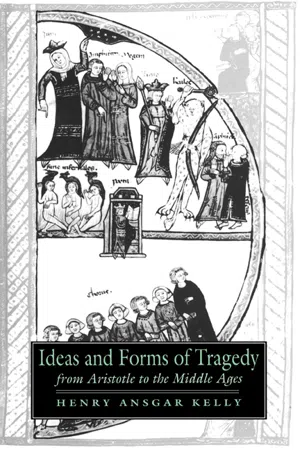
- English
- PDF
- Available on iOS & Android
Ideas and Forms of Tragedy from Aristotle to the Middle Ages
About this book
'Tragedy' has been understood in a variety of conflicting ways over the centuries, and the term has been applied to a wide range of literary works. In this book, H. A. Kelly explores the various meanings given to tragedy, from Aristotle's most basic notion (any serious story, even with a happy ending), via Roman ideas and practices, to the middle ages, when Averroes considered tragedy to be the praise of virtue but Albert the Great thought of it as the recitation of the foul deeds of degenerate men. Professor Kelly demonstrates the importance of finding out what writers like Horace, Ovid, Dante and Chaucer meant by the term, and how they used it as a tool of interpretation and composition. Referring to a wealth of texts, he shows that many modern analyses of ancient and medieval concepts and works are oversimplified and often result in serious misinterpretations. The book ends with surveys of works designated as tragedies in England, France, Italy and Spain.
Frequently asked questions
- Essential is ideal for learners and professionals who enjoy exploring a wide range of subjects. Access the Essential Library with 800,000+ trusted titles and best-sellers across business, personal growth, and the humanities. Includes unlimited reading time and Standard Read Aloud voice.
- Complete: Perfect for advanced learners and researchers needing full, unrestricted access. Unlock 1.4M+ books across hundreds of subjects, including academic and specialized titles. The Complete Plan also includes advanced features like Premium Read Aloud and Research Assistant.
Please note we cannot support devices running on iOS 13 and Android 7 or earlier. Learn more about using the app.
Information
Table of contents
- Cover
- Half-title
- Title
- Copyright
- Dedication
- Contents
- Preface
- List of abbreviations
- 1 Greek and Roman poetics
- 2 Modes and subjects of Roman tragedy
- 3 Early medieval clues and conjectures
- 4 The twelfth-century scene
- 5 The high Middle Ages: discoveries and oblivions
- 6 Final variations
- Conclusion
- Bibliography
- Index